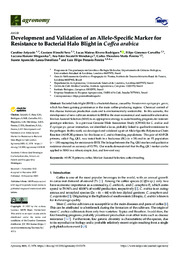Development and validation of an allele-specific marker for resistance to bacterial halo blight in coffea arabica.
Development and validation of an allele-specific marker for resistance to bacterial halo blight in coffea arabica.
Summary: Bacterial halo blight (BHB) is a bacterial disease, caused by Pseudomonas syringae pv. garcae, which has been gaining prominence in the main coffee-producing regions. Chemical control of this disease increases production costs and is environmentally undesirable. In this scenario, the development of new cultivars resistant to BHB is the most economical and sustainable alternative. Marker-Assisted Selection (MAS) is an appropriate strategy to assist breeding programs for resistant genotype selection. In a previous Genome-Wide Association Study (GWAS) for C. arabica and P. syringae pv. garcae interaction, we identified a locus, probably linked to qualitative resistance to the pathogen. In this work, we developed and validated a pair of Allele-Specific-Polymerase Chain Reaction (AS-PCR) primers for this locus in C. arabica breeding populations. This pair of AS-PCR primers, called Psg_QL1, was tested both in a backcross (BC) (n = 38) and in an F2 population (n = 138) segregating for resistance to BHB. The linkage between the Psg_QL1 marker and qualitative resistance showed an accuracy of 93.75%. Our results demonstrated that the Psg_QL1 marker can be applied in MAS in a robust, simple, fast, and low-cost way.
Publication year: 2022
Types of publication: Journal article
Unit: Embrapa Coffee
Observation
Some of Embrapa's publications are published as ePub files. To read them, use or download one of the following free software options to your computer or mobile device. Android: Google Play Books; IOS: iBooks; Windows and Linux: Calibre.
Access other publications
Access the Agricultural Research Database (BDPA) to consult Embrapa's full library collection and records.
Visit Embrapa Bookstore to purchase books and other publications sold by Embrapa.

